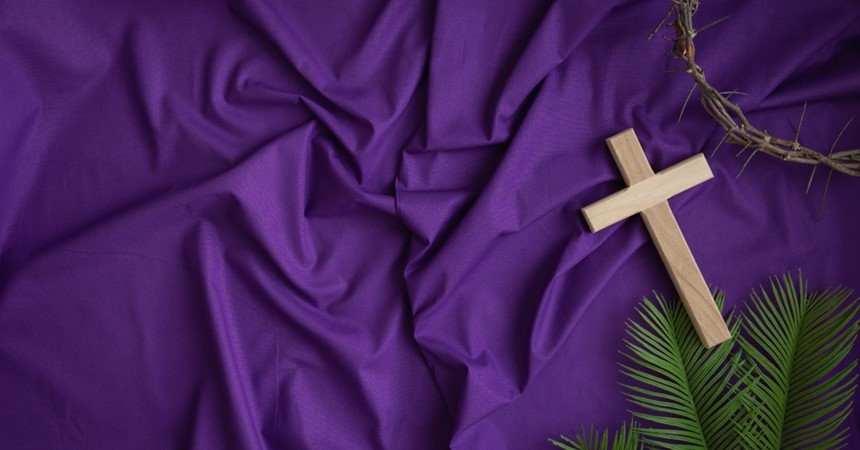What is Lent?
Lent begins on Ash Wednesday and ends at sunset, with Mass, on Holy Thursday. It is a 40-day time of prayer, fasting, and giving to the poor that helps Christians prepare to celebrate the Lord's Resurrection at Easter.
Why is Lent important?
For Christians it is a time of reflection and repentance. A time to make right with others and God as they are led to the Paschal Mystery, that is the passion, death, and resurrection of Jesus Christ.
Why is it 40 days?
In the Bible the number 40 would often indicate a time of trial, penance, renewal. In Luke we see this number being used to indicate the time Jesus fasted and was tempted in the desert prior to him starting his ministry.
Why is the colour purple significant during Lent?
Colours have always played an important part in the liturgical life of the church. Symbolically it can be used to represent royalty. Historically it was an expensive dye and only afforded by the wealthy. In the Gospel of Mark, we read that Pilate used a purple robe on Jesus to mock Him as “King of the Jews”.
Why do people fast from things?
Traditionally, fasting tended to be focussed on ‘things’ such as meat on Fridays, or chocolate, alcohol and so on. More and more the focus has become that of a conversion of the heart as Christians try to become more Christlike and give up the behaviours that are not life giving to others.
On what days are Catholics meant to fast?
It seems to be common knowledge that Catholics fast from meat during Lent. However, there are only two days the Church requires: Ash Wednesday and Good Friday. Christians are called to fast in other ways during this time. Such as sharing their time and gifts with others and donating money where it is needed, rather than for wants. This ‘fasting’ is something that we can do every day.
Why do we eat hot cross buns during Lent?
Hot cross buns traditionally were not eaten during Lent. They were only eaten on Good Friday symbolising the crucifixion of Jesus. The popularity of the bun has meant that contemporary society has flipped that tradition on its head where the simple hot cross bun has now morphed into many flavours that are available in supermarkets well before Lent has even started.
Why are the Stations of the Cross a popular devotion during Lent?
Being that Lent is a time of preparation to celebrate Easter, the fourteen Stations that walk people through the journey of Jesus to the cross, help Christians to pray and meditate on Jesus’ suffering and death.
Why do we eat pancakes on Shrove Tuesday?
Traditionally Shrove Tuesday was an opportunity to use up ‘rich’ ingredients such as butter, eggs, and sugar before fasting for the Lenten season. Pancakes are the most logical thing to cook. It is a tradition that is still popular with many today, especially children.

Why do people have an ash cross on their forehead on Ash Wednesday?
Catholics have been doing this for centuries. In the Old Testament wearing ashes was a common sign of repentance for sins, and a sign of one’s humility before God. Since Lent is a season of restoring relationships it’s appropriate that this ancient sign marks the beginning of the season.
What do the Palms recall?
On the first day of Holy Week (the beginning of the last week in Lent) Christians remember Jesus entering Jerusalem on a donkey. Palms were laid on the road and waved by the onlookers celebrating his arrival as ‘the king’. These palms symbolised triumph and victory.
I am not Catholic; how can I get involved with Lent?
You don’t have to be Catholic to get involved. Find time to make things right with people you may need to repair a relationship with. Donate time and/or money to people in need. Fast from things you enjoy. Maybe find time to read the Bible. It’s never too late to give that a go.
Follow mnnews.today on Facebook.

